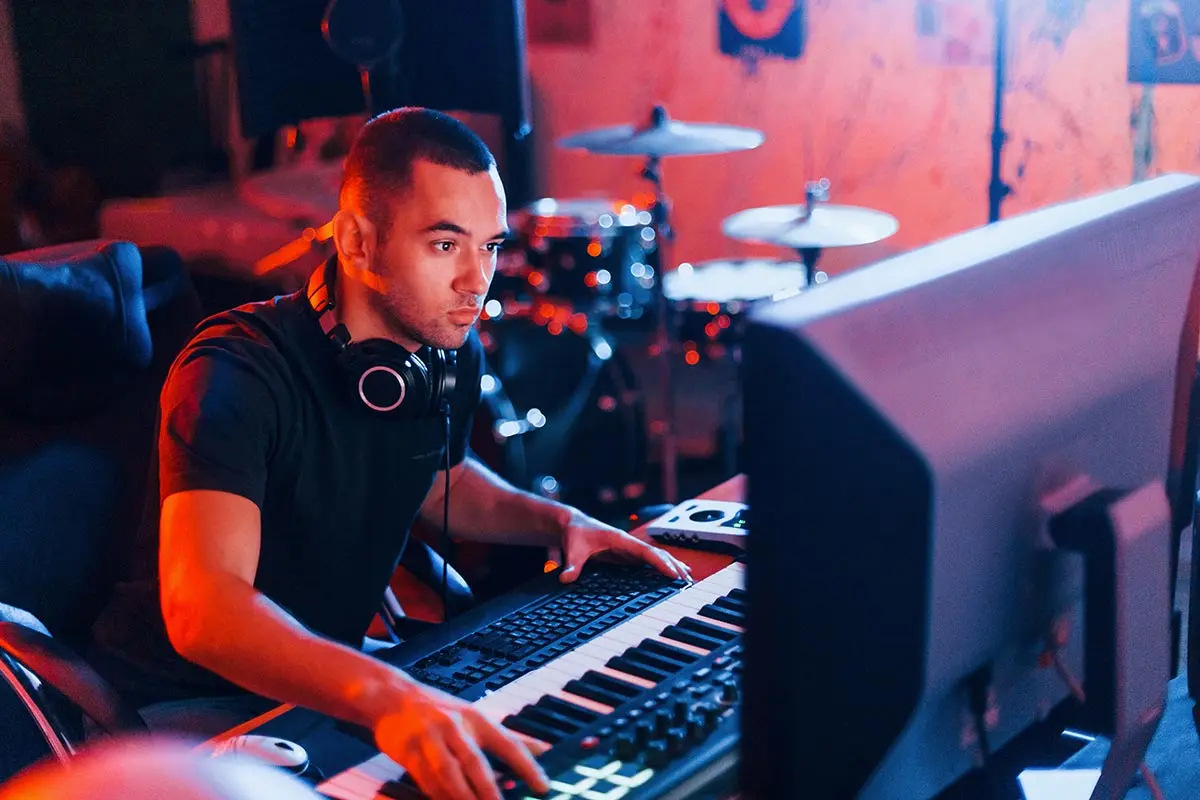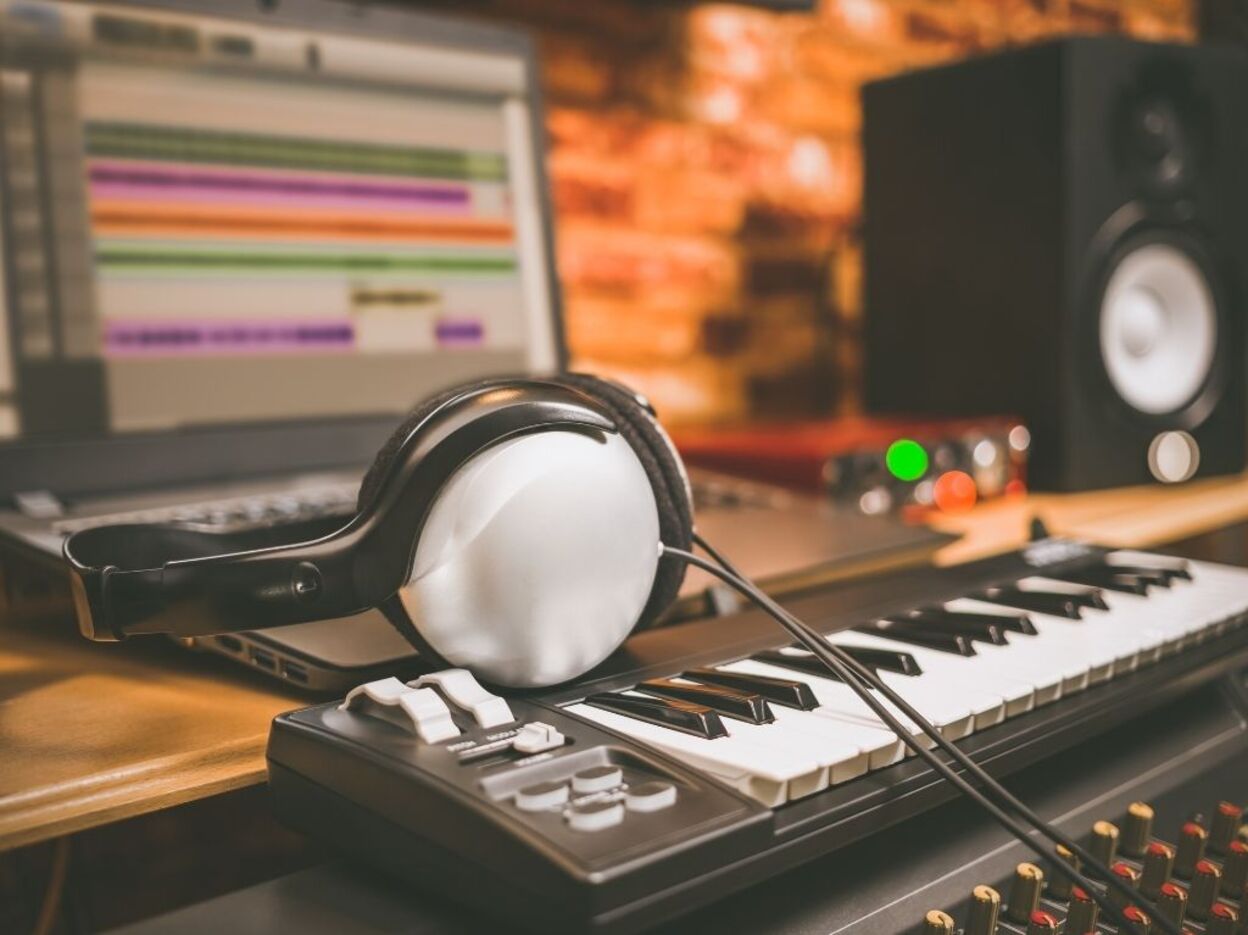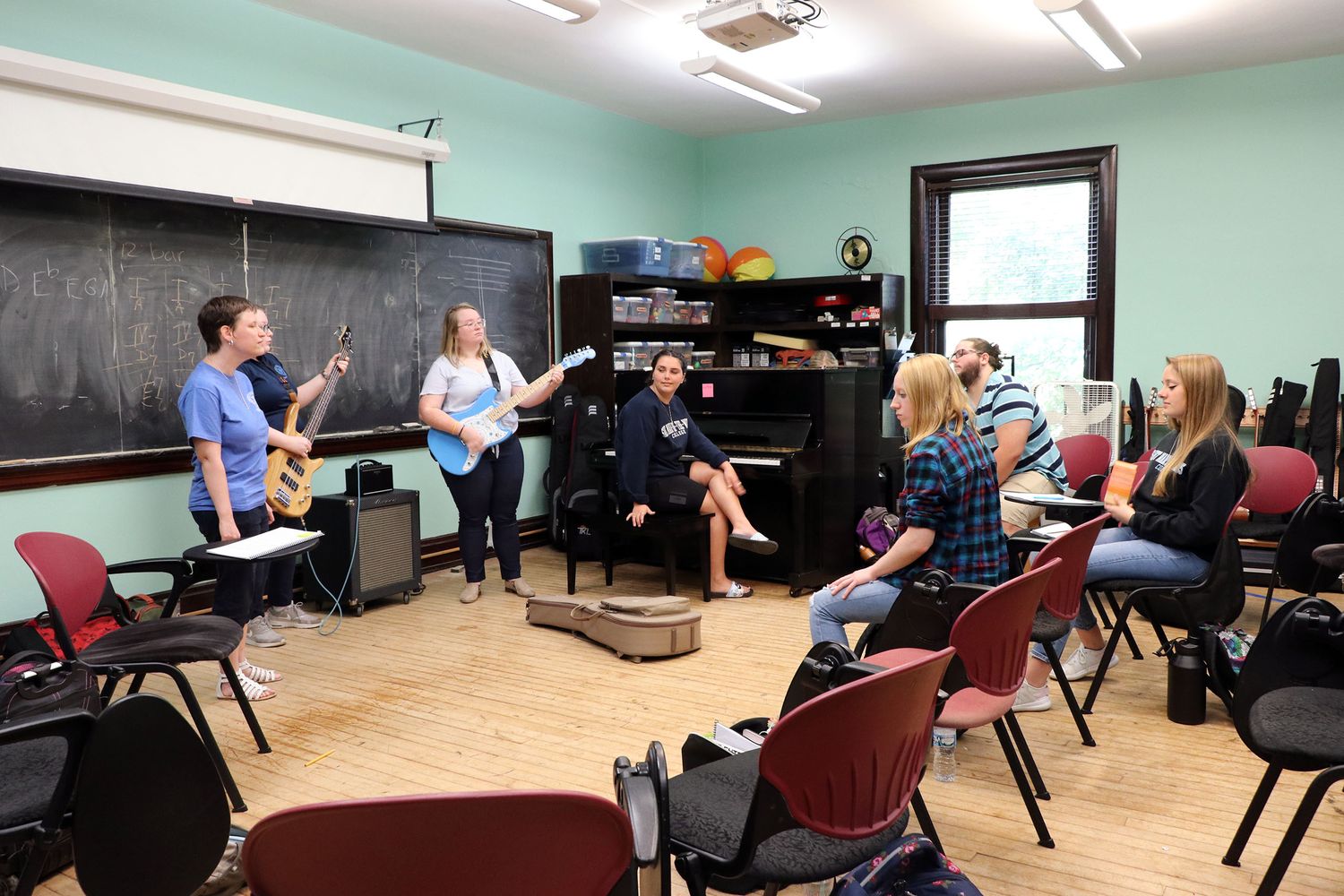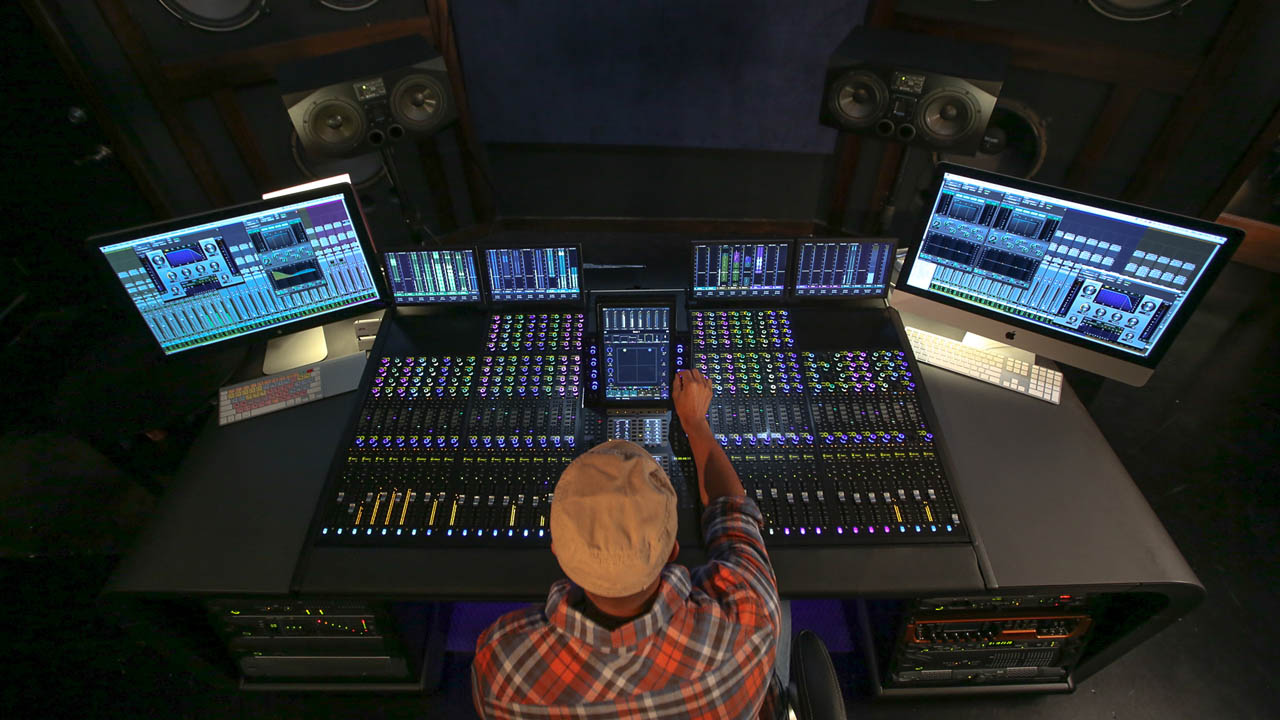Home>Production & Technology>Producer>How Many Years In College To Become A Music Producer


Producer
How Many Years In College To Become A Music Producer
Published: March 5, 2024
Learn how many years it takes to become a music producer and kickstart your career in the music industry. Explore the educational path and requirements to become a successful producer.
(Many of the links in this article redirect to a specific reviewed product. Your purchase of these products through affiliate links helps to generate commission for AudioLover.com, at no extra cost. Learn more)
Table of Contents
Introduction
Becoming a music producer is a dream for many individuals passionate about creating and shaping musical compositions. This dynamic field offers a platform for individuals to blend technical expertise with artistic creativity, resulting in the production of captivating music across various genres. However, the path to becoming a proficient music producer involves acquiring the necessary knowledge and skills through education and hands-on experience.
In the realm of music production, the journey to success often begins with a solid educational foundation. While there are no strict academic prerequisites to enter the field, pursuing formal education can significantly enhance one's understanding of music theory, sound engineering, and digital audio production. Additionally, it provides aspiring producers with valuable opportunities to hone their skills, network with industry professionals, and gain practical experience in recording studios and production environments.
Aspiring music producers have the option to pursue various educational paths, including bachelor's degree programs, associate's degree programs, and certificate programs tailored to music production. Each of these educational avenues offers unique benefits and caters to individuals with diverse career aspirations and time constraints. By exploring these educational options, aspiring music producers can chart a personalized course that aligns with their goals and interests, ultimately equipping them with the knowledge and expertise needed to thrive in the competitive music industry.
In the following sections, we will delve into the diverse educational requirements and pathways available for individuals aspiring to become music producers. From comprehensive bachelor's degree programs that provide in-depth training in music production to more streamlined certificate programs designed to impart specialized skills, each educational track offers a distinct approach to preparing future music producers for success in the industry.
Embarking on the journey to become a music producer involves a blend of passion, dedication, and a commitment to continuous learning. By understanding the educational landscape and the various pathways available, aspiring music producers can make informed decisions that propel them toward a rewarding and fulfilling career in music production.
Education Requirements for Music Production
To thrive in the competitive realm of music production, individuals often seek formal education to acquire the essential knowledge and skills that underpin this dynamic field. While there are no strict educational prerequisites for entering the music production industry, pursuing structured education can significantly enhance an individual's proficiency and marketability as a music producer.
One of the primary educational requirements for music production is a strong foundation in music theory and composition. Understanding the intricacies of musical elements such as harmony, melody, rhythm, and arrangement is crucial for aspiring music producers. This knowledge forms the backbone of their ability to craft compelling and cohesive musical pieces, making it an indispensable aspect of their educational journey.
In addition to music theory, proficiency in sound engineering and digital audio production is vital for aspiring music producers. These technical skills enable individuals to navigate digital audio workstations (DAWs), manipulate audio tracks, and employ various recording and mixing techniques to achieve desired sonic outcomes. Therefore, an educational program that offers comprehensive training in sound engineering and digital audio production is highly beneficial for aspiring music producers.
Moreover, practical experience in recording studios and production environments is invaluable for individuals pursuing a career in music production. Educational programs that provide opportunities for hands-on training, internships, or studio sessions allow aspiring producers to apply their theoretical knowledge in real-world settings, honing their skills and gaining exposure to industry-standard equipment and practices.
Furthermore, a thorough understanding of music technology and software applications is essential for modern music producers. Educational programs that incorporate training in industry-standard software, virtual instruments, and production tools equip individuals with the technical proficiency required to navigate the rapidly evolving landscape of music production.
Overall, the education requirements for music production encompass a multifaceted approach that combines theoretical knowledge, technical skills, practical experience, and technological proficiency. Aspiring music producers can fulfill these requirements through various educational pathways, each tailored to provide a comprehensive foundation for success in the music production industry. By embracing the educational journey and acquiring the necessary expertise, individuals can position themselves for a rewarding and impactful career as music producers.
Bachelor's Degree Programs in Music Production
Bachelor's degree programs in music production offer a comprehensive and in-depth approach to preparing aspiring music producers for the multifaceted demands of the industry. These programs typically combine rigorous coursework, practical training, and experiential learning to equip students with a well-rounded skill set essential for success in music production.
At the core of bachelor's degree programs in music production lies a robust curriculum that encompasses a diverse range of subjects relevant to the field. Students delve into music theory, composition, arrangement, and orchestration, gaining a deep understanding of the fundamental building blocks of musical expression. Additionally, coursework often includes modules on sound engineering, mixing techniques, digital audio production, and studio recording, providing students with a comprehensive grasp of the technical aspects of music production.
Furthermore, bachelor's degree programs often integrate practical training components, allowing students to apply their theoretical knowledge in real-world settings. This hands-on experience may involve working in professional recording studios, collaborating with musicians and artists, and participating in live sound production. Such immersive experiences not only refine students' technical skills but also cultivate their ability to navigate the dynamic and fast-paced environment of music production.
Moreover, bachelor's degree programs in music production frequently emphasize the utilization of industry-standard software and technology. Students have the opportunity to familiarize themselves with digital audio workstations (DAWs), music production software, and audio plugins commonly employed in professional settings. This exposure enables them to develop proficiency in using cutting-edge tools and techniques, empowering them to adapt to the evolving landscape of music production.
Additionally, these programs often incorporate elements of music business and entrepreneurship, equipping students with the knowledge and skills necessary to navigate the commercial aspects of the music industry. Understanding music copyright law, marketing strategies, and project management within the context of music production fosters a holistic perspective that prepares graduates to thrive in the competitive and dynamic music business landscape.
In essence, bachelor's degree programs in music production provide a comprehensive educational experience that blends theoretical knowledge with practical application, technical proficiency, and business acumen. By completing a bachelor's degree program in music production, aspiring music producers can emerge with a well-rounded skill set, a deep understanding of the industry, and the confidence to embark on a fulfilling and impactful career in music production.
Associate's Degree Programs in Music Production
Associate's degree programs in music production offer a condensed yet comprehensive educational pathway for individuals seeking to immerse themselves in the world of music production. These programs are designed to provide students with a focused curriculum that imparts fundamental knowledge and practical skills essential for navigating the dynamic landscape of music production.
At the core of associate's degree programs in music production is a curriculum that encompasses a range of foundational subjects relevant to the field. Students delve into music theory, digital audio production, sound engineering, and studio recording techniques, gaining a solid understanding of the technical and creative aspects of music production. This foundational knowledge serves as a springboard for students to explore their artistic expression and develop their unique approach to music production.
Moreover, associate's degree programs often incorporate hands-on training components, allowing students to apply their theoretical learning in real-world scenarios. Through studio sessions, live sound production projects, and collaborative endeavors, students gain practical experience that hones their technical skills and fosters an appreciation for the intricacies of producing music across various genres.
Additionally, these programs frequently emphasize the utilization of industry-standard software and technology, providing students with exposure to digital audio workstations (DAWs), music production software, and audio plugins commonly used in professional settings. This practical exposure equips students with the technical proficiency needed to navigate the evolving landscape of music production and adapt to emerging trends and innovations in the field.
Furthermore, associate's degree programs in music production may incorporate coursework that introduces students to the business aspects of the music industry. Modules focusing on music marketing, copyright law, and project management provide students with insights into the commercial dimensions of music production, empowering them to understand the industry's dynamics and potential career paths.
In essence, associate's degree programs in music production offer a focused and immersive educational experience that equips students with foundational knowledge, technical proficiency, and practical skills essential for a career in music production. By completing an associate's degree program in music production, aspiring music producers can embark on their professional journey with a solid educational foundation and a passion for creating impactful and engaging musical compositions.
Certificate Programs in Music Production
Certificate programs in music production offer a focused and streamlined educational pathway for individuals seeking to develop specific skills and expertise in the realm of music production. These programs are designed to provide targeted training in essential areas of music production, catering to individuals who may have time constraints or a desire for a more concentrated educational experience.
At the heart of certificate programs in music production is a curriculum that focuses on key aspects of music production, such as sound engineering, digital audio production, mixing techniques, and studio recording. By honing in on these critical areas, students gain a deep understanding of the technical and creative elements that underpin the production of high-quality music across diverse genres. This specialized knowledge empowers students to refine their craft and develop a distinct approach to music production.
Moreover, certificate programs often emphasize practical, hands-on learning, allowing students to apply their newly acquired knowledge in real-world scenarios. Through studio sessions, practical projects, and experiential learning opportunities, students gain valuable experience in utilizing industry-standard equipment and software, refining their technical skills and enhancing their ability to produce professional-grade music.
Additionally, certificate programs in music production frequently focus on the utilization of cutting-edge technology and software applications. Students have the opportunity to familiarize themselves with digital audio workstations (DAWs), music production software, and audio plugins commonly used in the industry. This exposure enables students to master the tools and techniques essential for modern music production, empowering them to adapt to the evolving landscape of the industry.
Furthermore, these programs may incorporate modules that introduce students to the business and entrepreneurial aspects of music production. By gaining insights into music marketing, copyright law, and project management, students develop a holistic understanding of the commercial dimensions of the music industry, preparing them to navigate potential career paths and opportunities within the field.
In essence, certificate programs in music production offer a focused and intensive educational experience that equips students with specialized skills, technical proficiency, and practical expertise essential for success in the music production industry. By completing a certificate program in music production, aspiring music producers can enhance their capabilities, refine their artistic vision, and embark on a fulfilling journey of creating impactful and compelling musical compositions.
Conclusion
In conclusion, the journey to becoming a proficient music producer encompasses a diverse array of educational pathways, each offering unique benefits and opportunities for aspiring individuals. Whether pursuing a bachelor's degree program, an associate's degree program, or a certificate program in music production, individuals embarking on this educational journey are equipped with the knowledge, skills, and practical experience necessary to thrive in the dynamic and competitive music industry.
Bachelor's degree programs in music production provide a comprehensive and in-depth educational experience, combining theoretical knowledge, practical training, and exposure to industry-standard technology. Students emerge from these programs with a well-rounded skill set, a deep understanding of music production, and the confidence to pursue diverse career opportunities within the industry.
Associate's degree programs in music production offer a condensed yet robust educational pathway, providing students with foundational knowledge, technical proficiency, and practical skills essential for navigating the multifaceted landscape of music production. Graduates of these programs are well-prepared to embark on their professional journey with a solid educational foundation and a passion for creating impactful musical compositions.
Certificate programs in music production cater to individuals seeking targeted training in specific areas of music production, offering a focused and intensive educational experience. Students completing these programs emerge with specialized skills, technical proficiency, and practical expertise, empowering them to refine their artistic vision and embark on a fulfilling career in music production.
Ultimately, the educational requirements for music production encompass a multifaceted approach that combines theoretical knowledge, technical skills, practical experience, and technological proficiency. By embracing the educational journey and acquiring the necessary expertise, aspiring music producers can position themselves for a rewarding and impactful career in music production. Whether pursuing a comprehensive bachelor's degree, a focused associate's degree, or a specialized certificate program, individuals have the opportunity to cultivate their passion for music production and make meaningful contributions to the vibrant and ever-evolving world of music.











